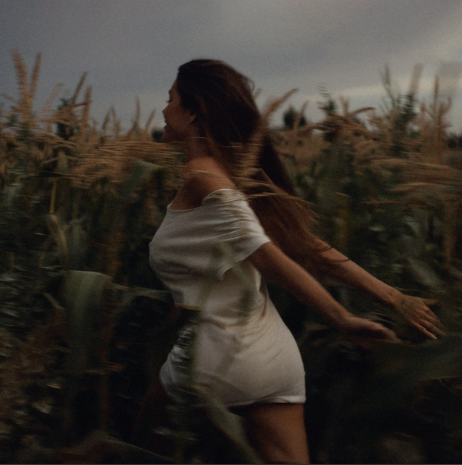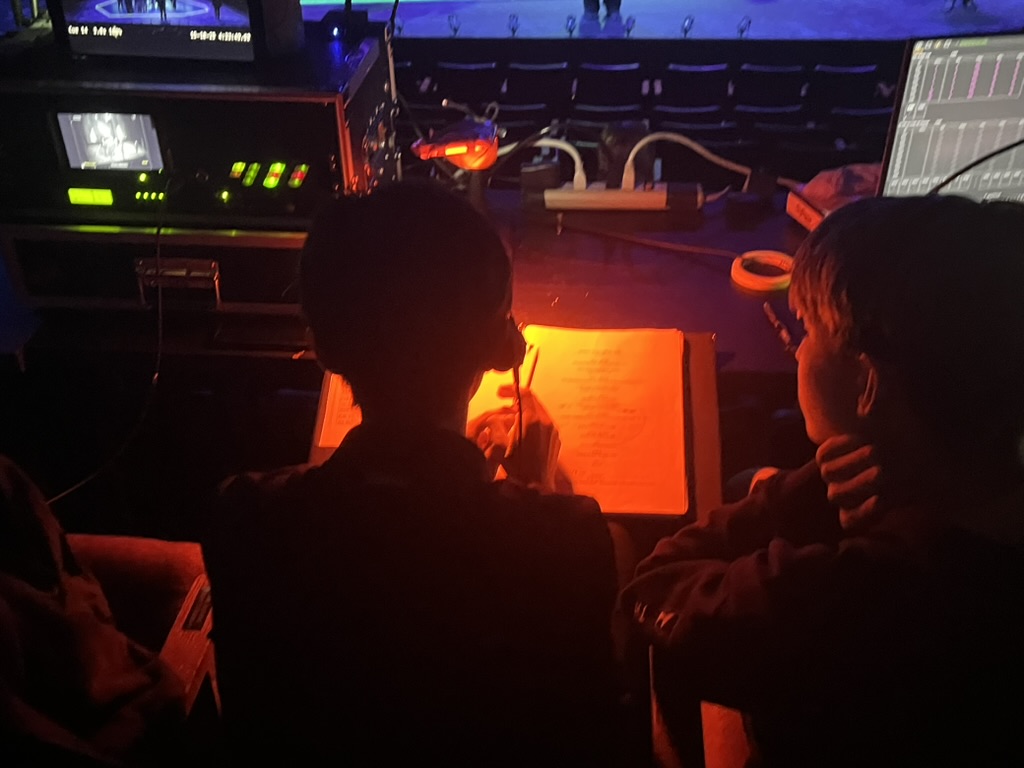Silence Between Songs represents the words you want to say but have never said.
Listening to the album brings you to a scene: sitting by a window, watching the rain droplets scatter across the frosted glass in the dim shadow that is your room. You’re on your couch, curled up alone with a blanket, wishing you had anyone to sit next to you so that you’re not alone with your thoughts.
But instead, you listen to the silence.
Singer-songwriter, author, and social media star Madison Beer released her second record, Silence Between Songs on Friday, September 15, 2023. Since her first album, Life Support, in 2016, Beer has taken a break from releasing entire new albums. Instead, she has focused on recording singles like the TikTok-famous “Reckless” during her break.
Beer explained in a 2023 interview with Vogue that this break was to help her focus on her mental health and self-discovery. “As I get older, I’ve learned to stop making myself feel guilty for taking breaks and time off and being a human and just swimming with my friends during the summer and not answering emails for a day,” she explained. “[The music] industry can be very intense and cutthroat and you can feel guilty for wanting to just be a human.”
The title of the album, Silence Between Songs, refers to her break from music albums in a way — a silent time. The album showcases the beauty of silence within modern pop songs, which are usually upbeat and lack those moments of pure silence.
During her time away from the music scene, Beer wrote her debut memoir, The Half of It (2023) in which she describes her mental health and experiences throughout her teenage years. “There were a lot of pivotal moments in the past couple of years, and opening those mental doors that I’d closed, and facing some truths that aren’t so pretty,” she explained.
All that reflecting clearly paid off. This album is an ethereal, dangerously alluring painting of retro-washed, cloud-soft, yet reeling and thundering melodies to encapsulate Beer’s organic self-discovery and growth; all in the span of 14 songs. Each song shows a range of styles throughout the decades, jumbled to create pleasant surprises. For example, a song that carries a 60’s Beach Boys style is “I Wonder.”
“Music that really stands the test of time is what I’ve been drawn to most, and so I wanted to capture the essence of that,” she said. “I definitely did want someone to pick up the record and be like, What year is this from?”
Track one, “Spinnin,” along with track three, “Envy The Leaves,” both describe Beer’s grappling with the concept of time and harsh reality. In “Spinnin,” she sings, “Did the world stop spinnin’? / Am I frozen in time? / ‘Cause the birds stopped singing / Are we flawed by design?” In this song, the music rocks back and forth in a floaty, plush cradle, like being lulled to sleep with the world spinning all around. The chord progression on the guitar is constant throughout the song, like an endless loop of time.
In “Envy The Leaves,” she describes the seasons through leaves. She sings, “I envy the leaves / That grow from the trees / They’re all so carefree / Through the seasons, unaware of the fall.” And later, the melody of this verse repeats itself after the chorus, where she describes the season of winter: “I envy the snow / How it’s blissfully cold / The world around it is meltin’, and it still doesn’t know.”
In both of these songs, she uses angelic harmonies to fill the silence between the musical verses. Throughout “Envy The Leaves,” she keeps a motif of a pulsating, muted piano, playing the same chord over and over again, like a cycle of time.
However, there are certain moments in the album where Beer strays from philosophical concepts like time and reality that reflect her thoughts in her daily life, and shifts to focus on the people surrounding her. Though emotional pop songs are often about breakups, one of the most impactful songs on the tracklist is the fifth track “Ryder.” This song is about her brother, Ryder Beer, and his endless love for her. It’s a collection of memories that send you back in time — you can almost see younger Madison tucking younger Ryder into bed in a little house on a grassy hill, the wind blowing the leaves around them.
In the song, she describes growing up with Ryder. “Grew up in the same house / So I know why you lash out,” she sings. In the second verse, she sings about herself: “I always left you out / You still loved me somehow / You just wanted a friend / Didn’t know it then.” In such lyrics, she perfectly captures the essence of siblinghood; how complicated yet simple it all is. Not only is she singing to her younger brother in “Ryder,” but she is also singing to her younger self. She laments, “Our youth down the drain / And I’ll take all of the blame / For all of the countless / Times that you cried.”
Other songs in her album, such as “Dangerous” and “Nothing Matters But You,” are tear-jerking and soul-aching in a hauntingly calm way. All songs in her angelic album never build to a point of harsh anger, but at a point just below it.
“Reckless,”, a song she released in 2021, is widely speculated to be about Jack Gilinsky, who allegedly cheated on Beer, and is now dating her rumored former best friend Geneva Natalia. She sings, “This chapter’s about / How you said there was nobody else / Then you got up and went to her house / You guys always left me out.”
However, none of Beer’s songs that describe romantic breakups or difficult times in a relationship are explicitly about one person. In “At Your Worst,” she sings about trying to justify the actions of others. “Oh, I know you got your reasons / You got your demons,” she hums in the first pre-chorus. “I hope I never hate myself / The way I know you hate yourself,” she laments.
She repeats this same phrasing to describe her own self-loathing, too: “And sometimes I still hate myself / The way you made me hate myself.” The tone in her voice here is one that has matured and is looking back on her situation with wisdom. Yet, at the same time, her initial emotions aren’t completely masked by time.
Her vocal tone, in every curve and crack, every word to every break, shows the rawness of her emotion at the time. This sentiment differs from her more recently-written songs in the album, and the tones in these two songs showcase her growth in an organic way — one that cannot be captured in music written in the same phase or moment in someone’s life.
“Silence Between Songs,” Track 13, builds in hardly any music. Her voice is so refined, smooth, and sharp that it is like a diamond cutting through cold ice. It’s a chill-sweeping, speech-like melody in which the silence builds anticipation for the muted beats and two-part harmonies.
Beer ends the album with a final song: “King of Everything.” It is full of diminished chords that seem so tall and regal that it contrasts yet blends perfectly with her soft, ethereal vocals. The song describes her past experiences with toxic relationships and environments. “Look what you’ve done / Taken advantage of people so young,” she sings. But she sings again, “When the rain comes pourin’ down / To wash away your crown / You’re the king of nothin’ now.” Those are her final lines to finish the album, complete with runs and riffs that shoot up to the moon.
Silence Between Songs holds almost emotions from nostalgia and longing to the fascination of self-discovery; no matter which song you choose to listen to, your heartstrings will bend and tug with the music, and tense when silence weaves in between the verses. It’s the kind of album so organic that it almost becomes a character of its own; once you meet it, you’ll never forget.




![Jackson Weisser (‘26), who played the title role of Beowulf, explained, “This adaptation specifically portrays Beowulf as having selfless motivations for a lot of his actions, and I think that's really powerful. Being more so a good person than a super physically intimidating person needing to fight all the time, is what I [want the audience to take away] from my performance of the character.”](https://thebishopstower.com/wp-content/uploads/2025/10/Beowolf26_047-800x1200.jpg)
![Leia (‘30) and Sara Park (‘32) ended their combative performance with a yell known as a kiyap. Leia explained with a proud smile, “I realized this when I was little, but not many people see taekwondo every day. For me, it’s a daily occurrence, so it feels very normal…when I do [a performance] in public, everyone’s like ‘Wow, that’s really cool’. So it always reminds me how this isn’t a normal thing in other people’s lives and I think it’s really cool that I can share that.”](https://thebishopstower.com/wp-content/uploads/2025/10/Screenshot-2025-10-02-at-2.07.47-PM.png)


